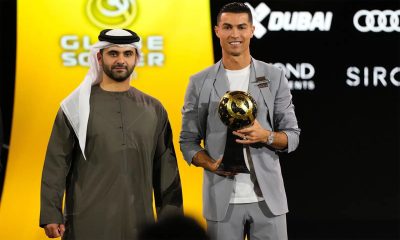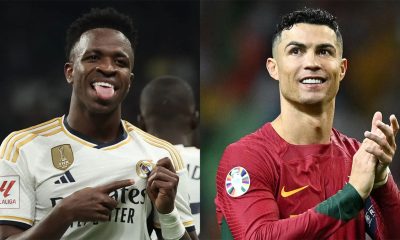Sports
How Ronaldo’s brilliance left 5 great Brazilian strikers in the shadows
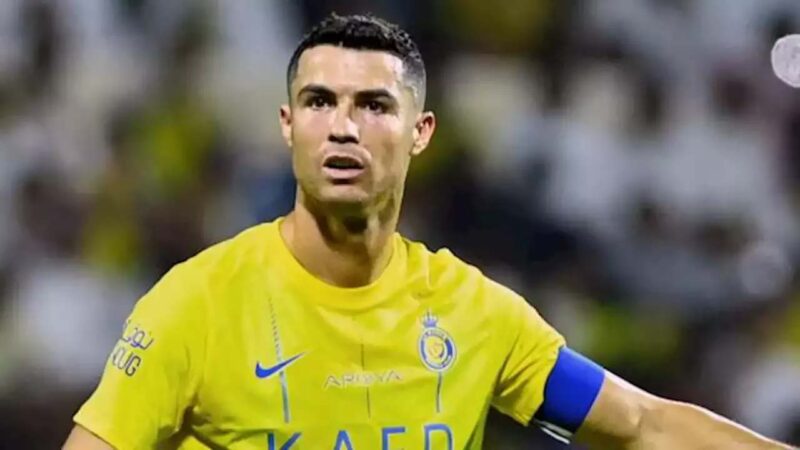
How Ronaldo’s brilliance left 5 great Brazilian strikers in the shadows
In the decade that followed Brazil’s 1994 World Cup triumph, the Selecao boasted an unparalleled plethora of attacking talents, yet none shone as brightly as Ronaldo.
O Fenomeno was in a class of his own; a dizzying mix of speed, dribbling, feints and clinical finishing that put him among the beautiful game’s very best.
While he excelled for PSV Eindhoven, Barcelona and Inter Milan and Real Madrid, the fondest memories of Ronaldo are usually tinged in the familiar yellow of Brazil.
World Cup and Copa America titles, along with countless other individual accolades, put him up there with Pele as a Selecao icon.
For some, living alongside that kind greatness came easy – the likes of Romario, Bebeto, Rivaldo, Edmundo and Ronaldinho all shone alongside O Fenomeno.
It’s the players who never got to share the spotlight being celebrated here. World-class talents left forever waiting in the wings for Brazil, born a decade too early and condemned to an international legacy unbefitting of their incredible talents.
Giovane Elber
In 10 seasons – three with Stuttgart and seven at Bayern Munich – Giovane Elber carved out a reputation as one of the Bundesliga’s greatest marksmen.
Elber was a different kind of striker to Ronaldo but no less worthy; a forward equally adept at linking the play and finishing off attacking moves. A heady mix of Brazilian flair and German work ethic.
Brought to Europe by AC Milan, Elber left the Rossoneri without playing for the first team, going on to enjoy prolific spells with Grasshopper Zurich and Stuttgart.
READ ALSO:
- 3 teenagers remanded in prison for causing disturbance around Wike’s house
-
Airport worker caught swallowing $300 stolen from passenger’s wallet + VIDEO
-
Obasanjo is Nigeria’s real problem – Estranged wife
His best years came at Bayern, though, with the Brazilian contributing to a period of success that included four Bundesliga titles, three German Cups and the Champions League.
Club top scorer in six of his seven seasons at Bayern, Elber’s 133 goals in 260 appearances made him the Bundesliga’s all-time top foreign goalscorer until Claudio Pizarro took his crown.
Yet throughout this time, Elber remained on the fringes of the Brazil national team. Like Ronaldo, Elber was a teen prodigy, emerging from the 1991 FIFA World Youth Championship, in which he scored four goals in six matches.
But in spite of this and his subsequent form in Germany, he had to wait until 1998 for a first senior call-up. His absence has long been attributed to his decision to play in Germany, with Brazil managers favouring players abroad drawn from Italy or Spain.
When he did get a chance, it came with a caveat: Luiz Felipe Scolari offered Elber the opportunity to replace the injured Ronaldo in Brazil’s squad for the 2001 Copa America in Colombia. Amid security concerns that had already seen Argentina withdraw entirely, Elber declined. Scolari refused to pick him again, ending any hopes he had of making the 2002 finals.
“The subject is closed,” Elber upon announcing his international retirement. “When the 2006 World Cup comes around, I will be 33 and I will not have the desire or the ability to play.”
He finished with seven goals in 15 games for Brazil.
Mario Jardel
One of Europe’s leading strikers in the late 1990s and early 2000s, the spectre of Ronaldo loomed large over Mario Jardel’s career.
Often inaccurately viewed as an out-and-out poacher, Jardel’s goalscoring repertoire was arguably more varied than even O Fenomeno’s. An exemplary finisher in the box, he was equally comfortable shooting from distance, while his bullet headers became something of a trademark.
Jardel also scored goals by the bucketload – 30 or more in each of his first six seasons in Europe – starting at Porto where he scored 166 goals in 169 appearances from 1997 to 2000. But it could have been even better.
READ ALSO:
-
I don’t know why Mohbad joined Naira Marley, he passed NECO at one sitting – Ex-principal
-
BREAKING: NLC begins nationwide strike indefinitely
-
Presidency retracts claims; says Tinubu not first African leader to ring closing bell at NASDAQ
Linked with the likes of Inter Milan and Barcelona, Jardel never got the chance to follow in Ronaldo’s footsteps at either, twice snubbed and instead signed by Galatasaray and, a year later, Sporting Lisbon.
Jardel scored 34 times for Gala during a single-season stay before moving on to Sporting in 2001, where he fired the club to a first league title in almost 20 years, scoring 42 goals in 30 league games.
That should have been enough to see Jardel at the 2002 World Cup – particularly as Ronaldo managed just seven goals in 16 that season – but his card had already been marked by Scolari.
In the summer of 2001, Jardel accepted the invite turned down by Elber to play for Brazil in place of Ronaldo at the Copa America in Colombia. He endured a torrid time, failing to score as Brazil exited in the quarter-finals to Honduras, confirming Scolari’s belief his stats were inflated in the process.
Omitted from the 2002 squad in favour of lesser names happy to warm the bench while Ronaldo starred, Jardel’s career never recovered. He left Sporting a year later, embarking on an increasingly nomadic career as a pale, bloated imitation of his former self.
Sonny Anderson
How do you replace a player like Ronaldo? For Barcelona, the answer was Sonny Anderson. Or at least, that was how the fans and press saw it.
Anderson had spent three years in France prior to his arrival at Barcelona in 1997. An initial six-month spell with Marseille brought 16 goals in 20 games but it was AS Monaco that the Brazilian truly carved out his reputation, scoring 64 times in 112 games for the Principality club.
The Brazilian was so much more than a goalscorer though. “He could finish with his left and right. Hold the ball up, win it in the air and play passes. He could do the lot. And he did it at lightning pace,” his Monaco team-mate, John Collins, told the BBC.
A league title winner with Monaco in 1997, Anderson was also Ligue 1 Player of the Year and the breakout star in a team featuring Emmanuel Petit, Thierry Henry, and David Trezeguet. That was enough to see Barcelona fork out €17million for his services, but supporters were unconvinced.
READ ALSO:
-
Kaduna refinery gives host communities lots of job slots – MD
-
Olayemi Cardoso, new CBN gov assumes duty as embattled Emefiele resigns
-
17-year-old student commits suicide in Makurdi— Police
“It was a very difficult time because when I arrived, I cost more money than Ronaldo and the fans expected from me a similar performance,” Anderson told Goal.
“Ronaldo was a unique player and the fans didn’t know much about me because I played in France.”
Despite scoring 10 times in La Liga during a double-winning debut campaign Louis van Gaal, the Ronaldo comparisons continued, especially as O Fenomeno bagged 25 for Inter that same season.
Though another title followed, it wasn’t long before Anderson was on his way back to France with Lyon, having become fed up with life under Van Gaal at a club where he was forever in the shadow of another Brazilian who wasn’t even there.
It was a move that curtailed any hopes of an international career. One that amounted to just six caps and, in truth, only began in August 1997 – around the time Anderson was being dubbed Ronaldo’s replacement.
Marcio Amoroso
Tipped to reach the same heights at Ronaldo in his younger years, at one point Amoroso looked on course to do exactly that – only for fate to intervene.
Having impressed in his homeland with Guarani, the Brazilian arrived in Italy in 1997, a year prior to Ronaldo, and quickly set about showing why he was one of Brazil’s most highly-rated youngsters at the time with Udinese.
The 22-year-old Amoroso defied his age to bag 12 goals in the ultra-defensive Serie A. An intelligent, skilful attacker capable of playing as a traditional number nine or 10, Brazil manager Mario Zagallo was among Amoroso’s many admirers and may well have taken him to the 1998 World Cup had he not been injured.
A year later, a fully-fit Amoroso was up and running and, most significantly, outscoring Ronaldo in Serie A, with a return of 22 goals making him the division’s top scorer for the 1998-99 campaign, eight ahead of O Fenomeno.
Picked as part of Vanderlei Luxemburgo’s Brazil squad for the 1999 Copa America, Amoroso shone again, scoring four goals en route to the title, including the opener in Brazil’s 2-1 semi-final win over Mexico.
Part of an attacking quartet that included Rivaldo, Ronaldinho and Ronaldo, he even won praise from the latter, who described him as “an animal” and “great to play with”. He could do no wrong.
It certainly seemed like that over the course of the 2001-02 campaign, with Amoroso making a flying start to life at new club Borussia Dortmund, following a £20million move, with a tally of 26 goals in 46 games helping the club win the Bundesliga. Amoroso finished as the top scorer in the process.
READ ALSO:
-
NFF seeks support for Osimhen’s Ballon D’or bid
-
Pastor arrested for allegedly killing girl in Delta community
-
Troops rescue 6 abducted Gusau varsity female students
Yet as the 2002 World Cup approached, a change of managers saw Amoroso out in the cold under Scolari. The Brazilian coach was unimpressed with European leagues outside of Italy or Spain and wasn’t one for changing his mind – even when Amoroso, fresh from scoring three times against AC MIlan in the UEFA Cup that season, told reporters: “The hat-trick is a message to Scolari.”
Omitted from the 23-man list, Amoroso’s later career was blighted by injury in an away similar to that of Ronaldo. But while O Fenomeno’s knack for timing saw him return at key moments for Brazil, his Copa America compatriot was less lucky.
Had Brazil lost the 2002 World Cup, then more may have been made of his omission. But, as the saying goes, history is written by the victors.
Giovanni
A precursor to Neymar among Santos fans, Giovanni Silva de Oliveira was handed the nickname “Messiah” among fans of the Brazilian club after a return of 37 goals in 36 games over two years.
Giovanni came up against a higher power when he joined Barcelona in 1996 though. Signed to primarily play as an attacking midfielder, he was equally effective in front of goal.
Classy, creative and boasting impressive technique on the ball, Giovanni might have stolen the show in that first season were it not for Ronaldo’s arrival.
Instead, he had to make do playing second fiddle as Barcelona’s second most exciting Brazilian prospect. There were occasional highlights along the way, with Giovanni scoring home and away against Red Star Belgrade in the European Cup Winners’ Cup and netting the winner against Real Madrid in the Copa Del Rey.
But Giovanni cut an increasingly peripheral figure as the season went on, used sparingly by Bobby Robson and forced to watch on as Ronaldo went from strength to strength. He scored 12 times in all competitions but was an unused sub in the European Cup Winners’ Cup final, watching on as you-know-who scored the winner.
With Robson moving upstairs and Ronaldo moving to Inter that summer, Giovanni must have thought he finally had a chance at living up to his Santos reputation. But he didn’t count on the disciplinarian approach of the incoming Louis van Gaal, a manager he claimed was “a Hitler for Brazilians”.
“He is arrogant, haughty and has a mental problem,” he told Folha. “He did not want Brazilians around him.
“He always said that we were not training well. Van Gaal has no idea of football and always comes with the same training sessions. He seems crazy.”
Giovanni soon departed for Olympiakos, where his all-action displays earned him the nickname The Wizard. But despite a fine career in Greece that included five league titles and some impressive goals, his star soon faded in Brazil.
Part of the Selecao squad for the 1997 Copa America and 1998 World Cup, he made little impact at either tournament and was not selected again. Ronaldo did considerably better.
He may have despised Van Gaal but part of The Wizard must have wished he could magic away Ronaldo.
How Ronaldo’s brilliance left 5 great Brazilian strikers in the shadows
Planet Football
Sports
Real Madrid demand referee change, could boycott Copa Del Rey final

Real Madrid demand referee change, could boycott Copa Del Rey final
Real Madrid refused to partake in planned Copa del Rey final related activities on Friday because they were angry at complaints made by the match officials earlier in the day, the club told media in Seville.
The referee for Saturday’s match against rivals Barcelona, Ricardo de Burgos Bengoetxea, welled up when speaking about pressure officials have faced from Real Madrid TV this season.
Spanish champions Real Madrid boycotted the press conference, the open training in front of media, the traditional presidents’ dinner and a pre-match photo-call.
“Real Madrid told the RFEF they will not take part in the press conference or the official training session looking forward to the (final),” said the Spanish football federation.
This week the club’s television channel launched a new video attacking the referee for the final, something they have done to various officials this season.
Los Blancos also published an open letter in February claiming Spanish refereeing was “rigged” and “completely discredited”.
Real Madrid have form when it comes to boycotts: in October they stayed away from the Ballon d’Or ceremony because their winger Vinicius Junior was not named the best player in the world.
“Real Madrid does not go where it is not respected,” the club said at the time.
De Burgos Bengoetxea had spoken about the effect criticism from Real Madrid’s television channel was having on his family life.
“When a child of yours goes to school and there are kids telling him that his father is a ‘thief’ and comes home crying, it’s totally messed up,” De Burgos Bengoetxea told a news conference.
“What I do is try to educate my son, to say that his father is honest, above all honest, who can make mistakes, like any sportsperson,” he continued, becoming emotional.
Real Madrid demand referee change, could boycott Copa Del Rey final
Sports
Pep Guardiola, wife to ‘give marriage a second chance’ after Barcelona reconciliation meeting

Pep Guardiola, wife to ‘give marriage a second chance’ after Barcelona reconciliation meeting
Pep Guardiola and his wife Cristina Serra are reportedly trying to reconcile their marriage, after the Man City boss spent three days with her in Barcelona over Easter.
Guardiola and Serra, a fashion entrepreneur, met back in 1994 and married in 2014.
News of their shock split became public in January, with reports the following month that the couple had begun divorce proceedings.
According to Catalan newspaper El Nacional, Guardiola and Serra are reportedly prepared to ‘give each other another chance’ and state that ‘all is not lost in their marriage.’
The report claims the Man City boss had returned to Barcelona over Easter and stayed in the family’s mansion in the city.
Previous reports have claimed Guardiola’s unexpected decision last November to renew his contract with the Premier League club for another two years had been a key factor in the split.

Pep Guardiola reportedly made a commitment to Cristina Serra in a bid to save their marriage

Guardiola’s decision to sign an two-year deal at Man City reportedly contributed to the split

Guardiola reportedly spent three days in Barcelona over Easter in a bid to reconcile with Serra
READ ALSO:
Serra returned to Barcelona with their youngest child in 2019 to focus on her business interests and was reportedly to have decided to split with Guardiola after learning of his decision to stay in the UK until 2027.
The latest report claims Guardiola has pledge to visit Barcelona once a week, then leave again due to his role as Man City head coach.
Maria Lapiedra, who is married to Barcelona based journalist Gustavo Gonzalez, told the outlet that Guardiola had made the commitment to prevent the couple going weeks without seeing each other.
The report also claims both Guardiola and Serra continue to wear their wedding rings, an apparent display that the couple of 30 years are seeking to reconcile.
Guardiola and Serra married in an intimate ceremony on the outskirts of Barcelona in 2014 but decided to part ways in December.
The couple, who met in 1994, had been living apart for more than five years after Serra moved back to Barcelona with one of their three daughters, Valentina, 17, while Guardiola remained in Manchester.
They have two other children together: Maria, 24 and Marius, 22.
Guardiola and Serra had remained a couple despite not living in the same city and have regularly been pictured together in the years since.

Serra, who had been with Guardiola for 30 years, had been living away from her husband

Guardiola reportedly made the commitment to fly back to Barcelona once a week to see Serra
Spanish outlet Sport reported earlier this year that the decision to end their marriage was made in December, with only members of their inner circle aware of the split. Their trusted friends and family have also been told not to disclose any further information, according to the publication.
Serra decided to leave Manchester in 2019 to help oversee the fashion company owned by her family, Serra Claret, which stocks several brands the City manager is often seen wearing.
Guardiola and Serra met while the former Barcelona and Bayern Munich boss was modelling for designer Antonio Miro in the shop in the Spanish city.
They began a long-distance relationship when Guardiola was a footballer, before they bought a home together in Barcelona. The couple later moved to Germany when Guardiola was manager of Bundesliga giants Bayern Munich.
Pep Guardiola, wife to ‘give marriage a second chance’ after Barcelona reconciliation meeting
Dailymail
Sports
Flying Eagles beat Egypt 2-1 in U-20 AFCON warm-up

Flying Eagles beat Egypt 2-1 in U-20 AFCON warm-up
Nigeria’s U-20 national team, the Flying Eagles, defeated their Egyptian counterparts 2-1 in a friendly match on Tuesday in Cairo, ahead of the 2025 U-20 Africa Cup of Nations (AFCON).
The News Agency of Nigeria (NAN) reports that the tournament will take place in Egypt from April 27 to May 18.
Kparobo Arierhi gave Nigeria the lead in the 10th minute after receiving a fine pass from Bidemi Amole and coolly slotting it home.
Egypt equalised in the 65th minute through Ahmed Kaabaka, but Nigeria regained the lead in the 83rd minute when Precious Benjamin scored from the penalty spot.
The penalty came after Divine Oliseh was fouled in the box.
The win is a big boost for Nigeria, who arrived in Egypt on Sunday for the 17th U-20 AFCON.
Nigeria, the seven-time champions, is in Group B and will play its first match against Tunisia on Thursday. It will also face Morocco and Kenya in the group stage.
NAN reports that the top four teams from the tournament will qualify to represent Africa at the FIFA Under-20 World Cup in Chile slated for Sept. 27 to October 19. (NAN)
-

 metro2 days ago
metro2 days agoOmokri : How Tinubu’s political mastery started with Abiola, says El-Rufai, Obi’s forces can’t stop him
-

 Education1 day ago
Education1 day agoJAMB officials seize candidates’ hijab at Caleb varsity, Muslim students kick
-

 metro5 hours ago
metro5 hours agoTruck falls from Lagos bridge on two buses
-

 Entertainment3 days ago
Entertainment3 days agoP-Square: Jude Okoye freed after two months detention
-

 International1 day ago
International1 day agoUS releases 41 countries granted 90-day entry without visas (full list)
-
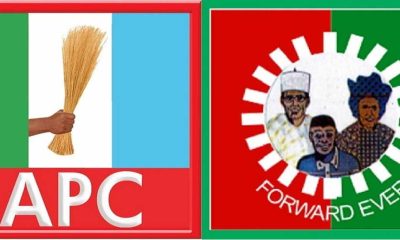
 Politics3 days ago
Politics3 days agoLabour Party collapses into APC in Plateau
-
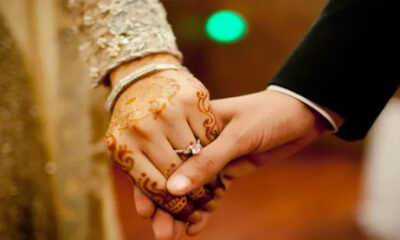
 metro2 days ago
metro2 days agoGroom cancels wedding, marries another lady same date, venue
-

 metro15 hours ago
metro15 hours agoEFCC declares four persons wanted over CBEX scam







